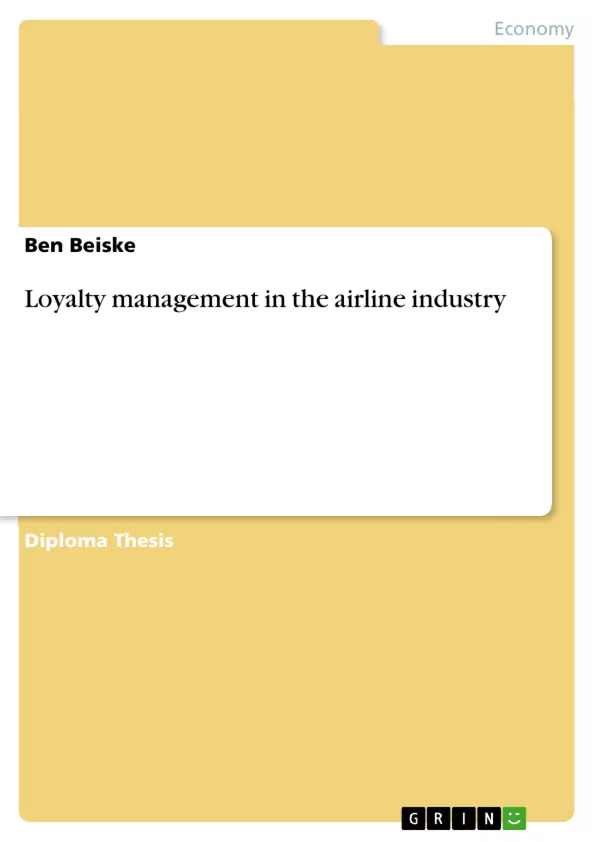This report will demonstrate the importance of Loyalty Management in the competitive environment of the airline industry and will show that a successful approach to Loyalty Management consists of three different, interlinked aspects. These three ′pillars′ are Customer Service, Frequent Flyer Programs, and Complaint Management; their interdependence will be analysed in depth, with special attention given to the perceived importance of Frequent Flyer Programs.
Findings show that customers do indeed perceive these issues as vital with regards to their loyalty towards a particular airline. It was found that Customer Service can be regarded as the foundation for Loyalty Management; it can help an airline to gain competitive advantage by setting it apart from its competitors. Frequent Flyer Programs, if implemented and run properly, can provide the customer with added value. As such, they compliment Customer Service and can help to increase overall loyalty. Additionally, Complaint Management was found to be gaining importance among airlines. The number of complaints was shown to be rising gradually, stressing the growing significance of efficient Complaint Management and its strong after-effect on customer loyalty.
Inhaltsverzeichnis (Table of Contents)
- 1. INTRODUCTION
- 1.1. AIM AND OBJECTIVES OF THE REPORT
- 1.2. TERMINOLOGY
- 1.3. BACKGROUND INFORMATION: LOYALTY MANAGEMENT
- 1.3.1. DEFINITIONS
- 1.3.2. TRADITIONAL MARKETING AND LOYALTY MANAGEMENT
- 1.3.3. IMPORTANCE OF LOYALTY MANAGEMENT
- 1.4. CHARACTERISTICS OF THE AIRLINE MARKET
- 1.4.1. AIRLINE INDUSTRY ANALYSIS - STEEPLE
- 1.4.1.1. Social
- 1.4.1.2. Technological
- 1.4.1.3. Economical
- 1.4.1.4. Environmental
- 1.4.1.5. Political
- 1.4.1.6. Legal
- 1.4.1.7. Ethical
- 1.4.2. CONSOLIDATION IN PRACTICE: BRITISH AIRWAYS
- 1.4.2.1. British Airways and KLM
- 1.4.2.2. British Airways and American Airlines
- 1.4.3. THE CURRENT AIRLINE SITUATION
- 1.4.1. AIRLINE INDUSTRY ANALYSIS - STEEPLE
- 2. LITERATURE REVIEW
- 2.1. CUSTOMER SERVICE
- 2.1.1. BACKGROUND INFORMATION
- 2.1.1.1. Singapore Airlines
- 2.1.2. REVELATION OF DISSATISFACTION
- 2.1.3. EMPLOYEES
- 2.1.4. COMMUNICATION
- 2.1.5. THE CUSTOMER
- 2.1.5.1. Customer Requirements
- 2.1.6. SERVICE QUALITY
- 2.1.6.1. Quality and Retaining Customers
- 2.1.7. ORIENTATION OF COMPANY
- 2.1.8. CONCLUSION CUSTOMER SERVICE
- 2.1.1. BACKGROUND INFORMATION
- 2.2. FREQUENT FLYER PROGRAMS
- 2.2.1. BACKGROUND INFORMATION
- 2.2.1.1. Statistics Frequent Flyer Programs
- 2.2.2. CRITICAL SUCCESS FACTORS FFPS
- 2.2.2.1. General Considerations
- 2.2.2.2. Whom to Target: Share of Customer
- 2.2.2.3. Program Structure
- 2.2.3. HARMONISATION BETWEEN FREQUENT FLYER PROGRAMS
- 2.2.1. BACKGROUND INFORMATION
- 2.1. CUSTOMER SERVICE
Zielsetzung und Themenschwerpunkte (Objectives and Key Themes)
This report aims to explore the significance of Loyalty Management within the highly competitive airline industry. It examines how a successful approach to Loyalty Management hinges on three interconnected elements: Customer Service, Frequent Flyer Programs, and Complaint Management. The report delves into the interdependence of these 'pillars' and scrutinizes the perceived importance of Frequent Flyer Programs.
- The vital role of Loyalty Management in the airline industry.
- The three key pillars of Loyalty Management: Customer Service, Frequent Flyer Programs, and Complaint Management.
- The interdependence of these pillars and their impact on customer loyalty.
- The perceived importance of Frequent Flyer Programs.
- The impact of effective Complaint Management on customer loyalty.
Zusammenfassung der Kapitel (Chapter Summaries)
The report begins with an introduction, setting the stage for the discussion on Loyalty Management in the airline industry. It defines key terms, examines the historical development of loyalty management, and analyzes the characteristics of the airline market. This introductory chapter also provides a framework for understanding the report's objectives and key themes.
The subsequent chapter dives into a comprehensive literature review, exploring different aspects of Loyalty Management. This section delves into Customer Service, examining its impact on customer satisfaction and loyalty. It explores key considerations such as employee satisfaction, communication strategies, and the importance of understanding customer requirements. Additionally, the literature review examines the effectiveness of Frequent Flyer Programs, analyzing their role in driving customer loyalty and analyzing factors that contribute to their success. This section also investigates the growing importance of efficient Complaint Management in fostering customer loyalty.
Schlüsselwörter (Keywords)
This report focuses on the critical elements of Loyalty Management within the airline industry. Key terms and concepts explored include customer service, frequent flyer programs, complaint management, customer loyalty, competitive advantage, airline industry analysis, and the STEEPLE framework.
Frequently Asked Questions
What are the three pillars of loyalty management in airlines?
The three interlinked pillars are Customer Service, Frequent Flyer Programs (FFPs), and Complaint Management.
Why is customer service considered the foundation of loyalty?
Superior customer service sets an airline apart from its competitors and is essential for retaining customers before additional rewards are even considered.
Do Frequent Flyer Programs (FFPs) actually increase loyalty?
Yes, if implemented properly, FFPs provide added value to the customer and compliment basic service, helping to increase overall brand loyalty.
What is the significance of complaint management for airlines?
As the number of complaints rises, efficient complaint management becomes vital to prevent customer churn and repair the relationship after a service failure.
What does the STEEPLE framework analyze in the airline industry?
STEEPLE analyzes Social, Technological, Economic, Environmental, Political, Legal, and Ethical factors that influence the current market situation for airlines.
- Quote paper
- Ben Beiske (Author), 2002, Loyalty management in the airline industry, Munich, GRIN Verlag, https://www.grin.com/document/4474



